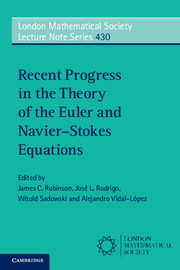Book contents
- Frontmatter
- Dedication
- Contents
- Preface
- List of contributors
- 1 Classical solutions to the two-dimensional Euler equations and elliptic boundary value problems, an overview
- 2 Analyticity radii and the Navier–Stokes equations: recent results and applications
- 3 On the motion of a pendulum with a cavity entirely filled with a viscous liquid
- 4 Modal dependency and nonlinear depletion in the three–dimensional Navier–Stokes equations
- 5 Boussinesq equations with zero viscosity or zero diffusivity: a review
- 6 Global regularity versus finite-time singularities: some paradigms on the effect of boundary conditions and certain perturbations
- 7 Parabolic Morrey spaces and mild solutions of the Navier–Stokes equations. An interesting answer through a silly method to a stupid question
- 8 Well-posedness for the diffusive 3D Burgers equations with initial data in H½
- 9 On the Fursikov approach to the moment problem for the three-dimensional Navier–Stokes equations
- 10 Some probabilistic topics in the Navier–Stokes equations
2 - Analyticity radii and the Navier–Stokes equations: recent results and applications
Published online by Cambridge University Press: 05 January 2016
- Frontmatter
- Dedication
- Contents
- Preface
- List of contributors
- 1 Classical solutions to the two-dimensional Euler equations and elliptic boundary value problems, an overview
- 2 Analyticity radii and the Navier–Stokes equations: recent results and applications
- 3 On the motion of a pendulum with a cavity entirely filled with a viscous liquid
- 4 Modal dependency and nonlinear depletion in the three–dimensional Navier–Stokes equations
- 5 Boussinesq equations with zero viscosity or zero diffusivity: a review
- 6 Global regularity versus finite-time singularities: some paradigms on the effect of boundary conditions and certain perturbations
- 7 Parabolic Morrey spaces and mild solutions of the Navier–Stokes equations. An interesting answer through a silly method to a stupid question
- 8 Well-posedness for the diffusive 3D Burgers equations with initial data in H½
- 9 On the Fursikov approach to the moment problem for the three-dimensional Navier–Stokes equations
- 10 Some probabilistic topics in the Navier–Stokes equations
Summary
Abstract
This note highlights recent work involving the analyticity radii of solutions to the 3D Navier–Stokes equations. In particular it includes estimates for a solution's local analyticity radius at interior points of possibly bounded domains and, as an application, a conditional regularity criteria in weak-L3.
Introduction
In this note we describe recent results involving the analyticity radii of solutions to the Navier–Stokes equations. The 3D Navier–Stokes equations govern the evolution of a viscous incompressible fluid's velocity field u subjected to a forcing f and read
where the scalar valued function p represents the fluid's pressure, v is the viscosity coefficient, u0 is the initial data which is taken in an appropriate function space, and Ω ⊆ R3 is a domain. When a boundary is present, Dirichlet boundary conditions are imposed along with a normalising condition on p.
A motivation for studying the analyticity radius of solutions to the 3D NSE lies in their connection to the dissipative scale in turbulence, see Foias (1995), Henshaw, Kreiss, & Reyna (1995, 1990), Monin & Yaglom (1971). The turbulent energy cascade refers to a process in which energy is transported by inertial mechanisms from larger to smaller scales in a statistically regular manner (see Frisch, 1995). In the absence of viscosity these dynamics saturate all scales below some macroscale associated with the fluid's environment and forcing. In viscous flows, friction dissipates energy at small scales which breaks down the Eulerian cascade dynamics. The dissipative scale refers to the length at which inertial forces become subordinate to the diffusive effects of viscosity. This is realized mathematically as the exponential decay of the Fourier spectrum of an analytic solution to 3D NSE at frequencies beyond the inverse of the analyticity radius.
The real analyticity of strong solutions to 3D NSE is a classical result (see Giga, 1983, Komatsu, 1979, Masuda, 1967). Early estimates from below for a solution's analyticity radius were provided in Foias & Temam (1989), Komatsu (1979). In Foias & Temam (1989), these estimates are obtained using Gevrey classes in an L2 setting. As this approach depends heavily on Fourier analysis, it is most applicable to uniformly real analytic solutions and does not clearly extend to formulations of 3D NSE on domains possessing boundaries or where the forcing is only locally analytic.
- Type
- Chapter
- Information
- Publisher: Cambridge University PressPrint publication year: 2016



